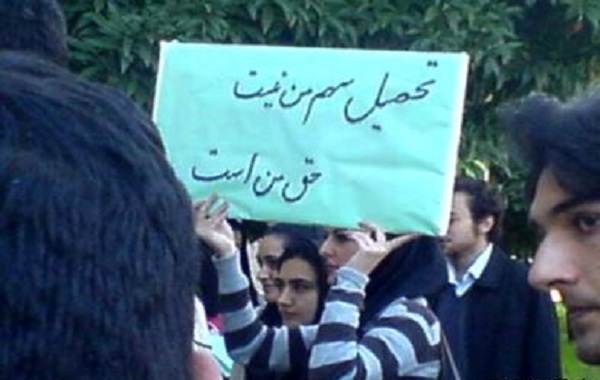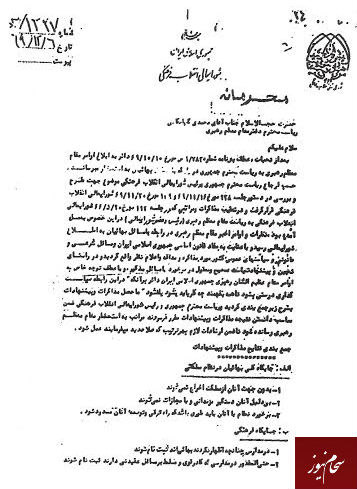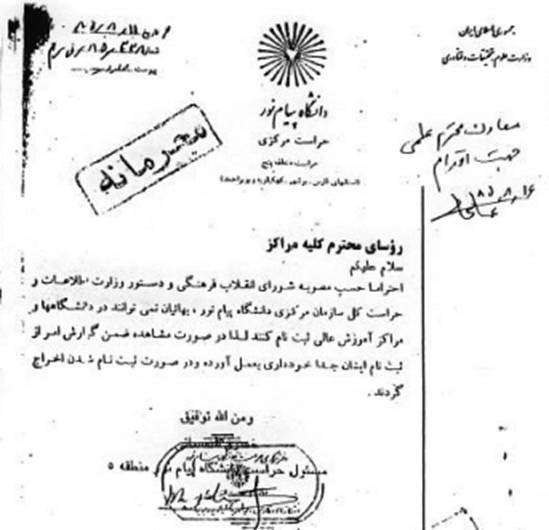Source: sahamnews.org
The High Council for the Cultural Revolution, in a secret document: The development and advancement of Baha’is must be blocked.

According to a document with a security classification of “secret”, which has been made available to Saham by the news media, and which has already been published in the media, members of the High Council of the Cultural Revolution were tasked by a direct order from the Supreme Leader Ayatollah Khamenei with devising “a comprehensive and permanent policy to deal with the Baha’is in the country”, and sending it to the Supreme Leader so it could be issued as an order.
According to Saham, this secret document which was ratified on the 5 Feb 1991 and 9 Feb 1991 meetings of the High Council of Cultural Revolution, and submitted to the Head of the Office of the Supreme Leader, Mohammadi Golpayegani, to be issued in the name of the Islamic Republic’s Supreme Leader, explicitly states that “conflict with them [Baha’is] must be undertaken in such a way that their progress and development are blocked.” Moreover, the Supreme Council of the Cultural Revolution has repeatedly approved, in frequent meetings, “to register them [Baha’is] in the type of schools which have strong control and dominance over ideological issues.”
It seems that the decisions of the Supreme Council of the Cultural Revolution and the subsequent command by the Supreme Leader of the Islamic Republic to deprive part of the community of the right to an education is an unequivocal contradiction of the constitution of the Islamic Republic of Iran and the intentions of the founder of the Islamic Republic, since this “comprehensive policy to limit the Baha’i Community within the country” and “viewing a portion of the population as enemies due to misguided illusions” was not pursued prior to this date, since the time of the leadership of Imam Khomeini. This new strategy was adhered to after the election of the new leader, with a request from the new supreme leader to the Supreme Council of the Cultural Revolution to designate “restrictive policies against the civil rights of a portion of the country’s population” for submittal to the successor to the founder of the Islamic Republic.
– Article Fourteen of the constitution of the Islamic Republic states: As ordered in this honorable verse (Quran 60:8) “God does not forbid you from those who do not fight you because of religion and do not expel you from your homes ‒ from being righteous toward them and acting justly toward them. Indeed, God loves those who act justly.” the Islamic Republic of Iran and all Muslims are required to deal with non-Muslims with nobility and Islamic justice, and to respect their human rights. This principle applies with respect to those who do not act in conspiracy against Islam and the Islamic Republic of Iran.
– Article Nineteen of the constitution states: “The people of Iran, no matter to what ethnicity or tribe they belong, enjoy equal rights; attributes such as color, race, language, and so forth will not constitute any advantage for anyone.”
– Based on the Twentieth Article of the constitution, “All citizens, both men and women, have equal protection of the law, and enjoy all human, political, economic, social and cultural rights, in compliance with Islamic values.”
– In the Thirtieth Article of the constitution, as accepted by the people, it is explicitly stated: “The government must provide free education for all citizens up to secondary school, and expand the means for higher education for free to the extent of the self-sufficiency of the country.”
Based on the above-mentioned articles of the constitution and some other principles of the law, which directly or indirectly rule over the rights, progress and development of Iranian citizens (even non-Muslims), in several meetings of the High Council of the Cultural Revolution and resulting decisions regarding this part of our population, these principles as stated in the constitution have been violated. The current president, Hassan Rouhani, who is in charge of the implementation of the constitution, and who is responsible for guaranteeing the civil rights of all Iranian citizens, has acted contrary to constitutional law, which is an act punishable by the judiciary system and the court of law.
Some text and an image of a page of this secret document, which has been provided to Saham is provided below*:
Honorable Hojjatoleslam Mohammadi Golpaygani,
Head of the Office of the Supreme Leader
Greetings
With regard to the 1/782 Letter dated 31 December 1990, which conveyed the orders of the Supreme Leader in connection with the designated agenda related to Baha’is, to the president’s office, this is to inform you that inasmuch as the President referred this subject to the Head of the High Council of Cultural Revolution, the subject was added to the agenda of meeting 128 on 05 Feb 1991, and meeting 129 on 09 Feb 1991 of the High Council of the Cultural Revolution for review. Continuing on the same track of negotiations and terms discussed in the 112th meeting on 11 August 1987 of the High Council of Cultural Revolution presided over by the Supreme Leader (Head and member of the High Council of the Cultural Revolution), which was arranged for the same purpose, the latest views and orders of the supreme leader in connection with the Baha’i issue were submitted to the Council, and they were discussed and decided upon with due regard to the provisions of the articles of the Constitution of the Islamic Republic, Sharia law (religious ordinances), legal issues, and the public policies of the nation. Keeping the orders of the exalted station of the Supreme Leader in mind, requiring the setting of appropriate policies so that all will know how to proceed, the discussions and conclusions were summarized as shown below. The respected President of the Islamic Republic [at that time Akbar Hashemi Rafsanjani], and the Head of the High Council of the Cultural Revolution, while finding the results of the discussions and suggestions appropriate, ordered the terms be submitted to the Supreme Leader for his guidance and implementation as he sees fit.

A summary of the conclusions and reccomendations resulting from the discussions:
A – Status of Baha’is in the government system:
1) Not to be expelled from the country without a reason.
2) Not to be arrested or detained without a reason.
3) The system should deal with them in such a way that their path to progress and development is blocked.
B – Cultural Status:
1. Register in schools if they do not reveal their Baha’i Faith.
2. To the extent possible limit their attendance only to those institutions that have staff that are strong and dominant on ideological issues.

* A more complete translation of the text is available at http://news.bahai.org/human-rights/iran/education/feature-articles/secret-blueprint
Leave a Reply